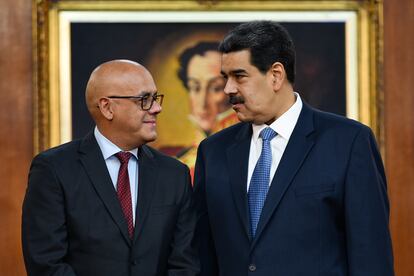Venezuela says it will not accept European observation during 2024 presidential elections
The stance comes after the European Parliament condemned the ban on María Corina Machado, a frontrunner in the polls, from public office

The president of the Venezuelan National Assembly, Jorge Rodríguez, announced on July 13 that Nicolás Maduro’s government will not be allowing the European Union Observation Mission into the country to oversee the 2024 presidential elections. The usually moderate Rodríguez launched into a tirade during a legislative session, saying, “We do not have time to consider the request. I am telling you directly, Josep Borrell [High Representative of the Union for Foreign Affairs and Security Policy], as long as we are the representatives of the Venezuelan State, you will not come. No mission from Europe is going to come here.”
Having been careful to cultivate relations with Europe in recent years, Rodríguez was responding to the pronouncement of the European Parliament on the political situation in Venezuela. On July 12, the European Parliament voted heavily to condemn the ban from public office of María Corina Machado, the opposition leader who is ahead in all the opinion polls for the opposition primaries, expressing again its “concern” over the evolution of the Venezuelan regime and calling for the release of 280 political prisoners.
In recent months, Maduro and Rodríguez’s more conciliatory attitude and willingness to engage in dialogue has cooled as they wrestle with their adversaries. The Chavist delegation that initially agreed to sit down at the negotiating table with the opposition in Mexico is now refusing to engage with the anti-Chavist leaders. The Venezuelan president has made any concession dependent on the release of businessman Alex Saab, who was imprisoned for money laundering in the U.S. He is also demanding the lifting of sanctions adopted by the U.S, Canada and the EU.
In the last few days, fears have increased among the opposition about the possibility that the country’s Supreme Court, which is heavily Chavist, may issue a ruling admitting the organization of the primaries, but forcing the opposition to deal with an entirely new board of the National Electoral Council (CNE), which has not yet been appointed. This ruling would not be in the opposition’s favor, given it had already decided to organize the primaries without state support after the resignation of the previous CNE directive. A replacement dictated by the Chavists would in all probability generate new divisions within the opposition leadership.
The previous CNE directive was relatively neutral and the result of a political agreement with the opposition in 2021, but it unilaterally resigned before the National Assembly several weeks ago, without giving any official explanation. The opposition university rectors were also forced against their will to resign shortly after the opposition Electoral Commission requested their assistance in organizing the primaries.
On July 12, at the Andrés Bello Catholic University, the debate between the 10 candidates for the primaries organized by the Unitary Platform through its Electoral Commission involved members of the public, and included Venezuelans who had left Venezuela in search of opportunities elsewhere. In a final address to the press, Machado, who claims she is seeking to bring the opposition together and overcome any unpleasantness with other candidates, refused to take the hand of her fellow aspirants to make the victory sign.
Although the Chavist elite generally avoid naming Machado, there is clearly concern at the rapid growth in popularity of the most intransigent and anti-communist figure in the opposition. It is a popularity that, according to analysts such as Felix Seijas of the Delphos firm, “has doubled in little more than a month, giving her twice as many close followers who have a very committed voting intention.”
Machado’s rise has forced a government that is struggling in the polls, and wrestling with the economy, to use all the powers at its disposal to eliminate her. But Machado has declared that her candidacy will continue “until the end,” and has declared that she will never abide by any measure forged by Chavist institutions.
Sign up for our weekly newsletter to get more English-language news coverage from EL PAÍS USA Edition
Tu suscripción se está usando en otro dispositivo
¿Quieres añadir otro usuario a tu suscripción?
Si continúas leyendo en este dispositivo, no se podrá leer en el otro.
FlechaTu suscripción se está usando en otro dispositivo y solo puedes acceder a EL PAÍS desde un dispositivo a la vez.
Si quieres compartir tu cuenta, cambia tu suscripción a la modalidad Premium, así podrás añadir otro usuario. Cada uno accederá con su propia cuenta de email, lo que os permitirá personalizar vuestra experiencia en EL PAÍS.
¿Tienes una suscripción de empresa? Accede aquí para contratar más cuentas.
En el caso de no saber quién está usando tu cuenta, te recomendamos cambiar tu contraseña aquí.
Si decides continuar compartiendo tu cuenta, este mensaje se mostrará en tu dispositivo y en el de la otra persona que está usando tu cuenta de forma indefinida, afectando a tu experiencia de lectura. Puedes consultar aquí los términos y condiciones de la suscripción digital.








































